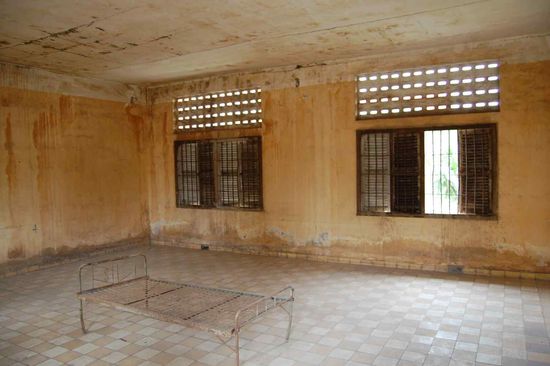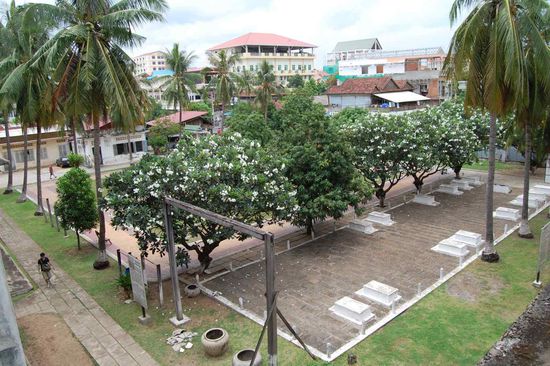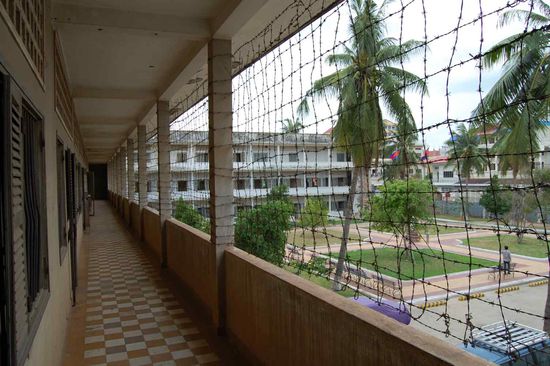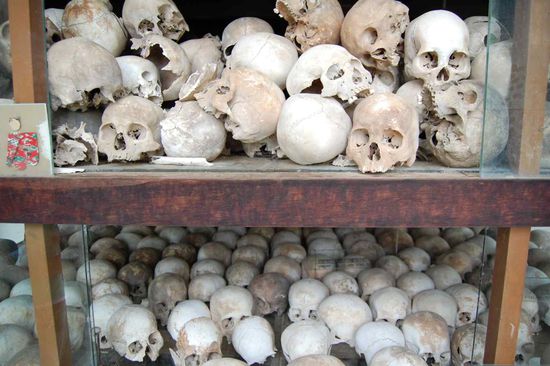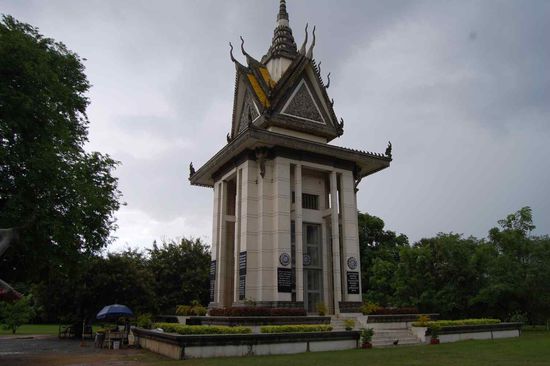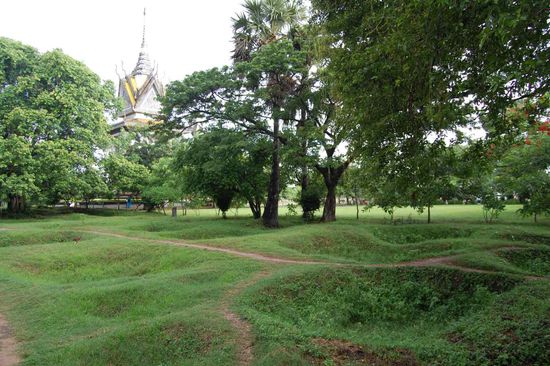South-East Asia
Killing fields
"No religious rituals. No religious symbols. No fortune tellers. No traditional healers. No paying respect to elders. No social status. No titles. No education. No training. No school. No learning. No books. No library. No science. No technology. No paper. No currency. No bartering. No buying. No selling. No begging. No giving. No purses. No wallets. No human rights. No liberty. No courts. No judges. No laws. No attorneys. No communications. No public transportation. No private transportation. No travelling. No mailing. No visiting. No inviting. No faxes. No telephones. No social gatherings. No chitchatting. No jokes. No laughter. No music. No dancing. No romance. No flirting. No fornication. No dating. No wet dreaming. No masturbating. No naked sleepers. No bathers. No nakedness in showers. No love songs. No love letters. No affection. No marrying. No divorcing. No martial conflicts. No fighting. No profanity. No cursing. No shoes. No sandals. No toothbrushes. No razors. No combs. No mirrors. No lotion. No make up. No long hair. No braids. No jewelry. No soap. No detergent. No shampoo. No knitting. No embroidering. No colored clothes, except black. No styles, except pyjamas. No wine. No palm sap hooch. No lighters. No cigarettes. No morning coffee. No afternoon tea. No snacks. No desserts. No breakfast (sometimes no dinner). No mercy. No forgiveness. No regret. No remorse. No second changes. No excuses. No complaints. No grievances. No help. No favors. No eyeglasses. No dental treatment. No vaccines. No medicines. No hospitals. No doctors. No disabilities. No social diseases. No tuberculosis. No leprosy. No kites. No marbles. No rubber bands. No cookies. No popsicle. No candy. No playing. No toys. No lullabies. No rest. No vacations. No holidays. No weekends. No games. No sports. No staying up late. No newspapers. No radio. No TV. No drawing. No painting. No pets. No pictures. No electricity. No lamp oil. No clocks. No watches. No hope. No life. A third of the people didn't survive. The regime died."
That's how a survivor's poem in one of the detention centers described the desperate fate that the Cambodians faced during the bloody reign of Pol Pot from 1975 to 1979 and the Khmer Rouges attempt of stone-age communism.
Probably few in the west know much about the Cambodian dark age, and a visit to the countries memorial sites is quite an eye-opener and a very sobering, disturbing and unforgettable experience.
After conquering the capital Phnom Penh in April 1975, the Khmer Rouge forcefully emptied all cities of the country (of then 3 million inhabitants in PP, only 40.000 were left in the city a couple of weeks later) and forced the whole countries population to work in agricultural communes under most primitive conditions, while killing all those the regime considered enemies of the revolution. That included ethnic minorities, people speaking foreign languages, people wearing glasses (that meant they had to be intellectuals), people related to the former government, and everyone who somehow raised suspicion of a highly paranoid leadership. The country was totally closed to any foreign influence, money was abolished, families disbanded, and people herded together in communes, helplessly delivered to an indifferent regime that killed hundred thousands (guesses vary between 1,5 and 2,5 million victims)at will with most primitive tools, cynically telling its subjects "To have you is no gain. To lose you is no loss."
After Vietnam invaded and ended the Khmer Rouge reign in 1979, a civil war followed that lasted until the nineties and left the country as the most heavily mined battlegrounds in the world. The war crime tribunals against the leaders is still ongoing, as it proves very difficult and sensitive to evaluate the statements, confessions and documents by victims and perpetrators.
The visit to the Tuol Sleng Genocide Museum (formerly named S-21 detention center, a former school where the Khmer Rouge tortured their victims for confessions of crimes they didn't do and to denunciate family members and friends) and the Killing Fields is deeply depressing and disturbing. In front of the museum, several heavily wounded mine victims beg for money - hopefully I will never see such injuries again. Inside, the now empty cells and some photo documentations give a sad impression of the cruelties that happened there 30 years ago. Many, both the victims and those who executed the atrocities were just kids or teens. It is almost impossible for us as foreigners to find a sensitive way of asking people about what happened, and how it could happen, as it either results in refusal to talk about it or in emotional outbreaks.
The Killing Fields of Chong Euk outside Phnom Penh are the ground to which the inmates of S-21 were sent for execution. The area is covered with water-filled holes, which are the excavated mass graves of about 10.000 victims, most of them not even shot but killed by using sickles, pickaxes or sticks, while there is even a tree that was used to kill babies.
It is a very respectable achievement of the Cambodians that today they are such an optimistic, friendly, open and hospitable nation despite of its cruel and unforgettable past.
| Start of journey: | Mar 21, 2009 |
| Duration: | 5 months |
| End of journey: | August 2009 |
Laos
Cambodia
Vietnam
Singapore
Malaysia
